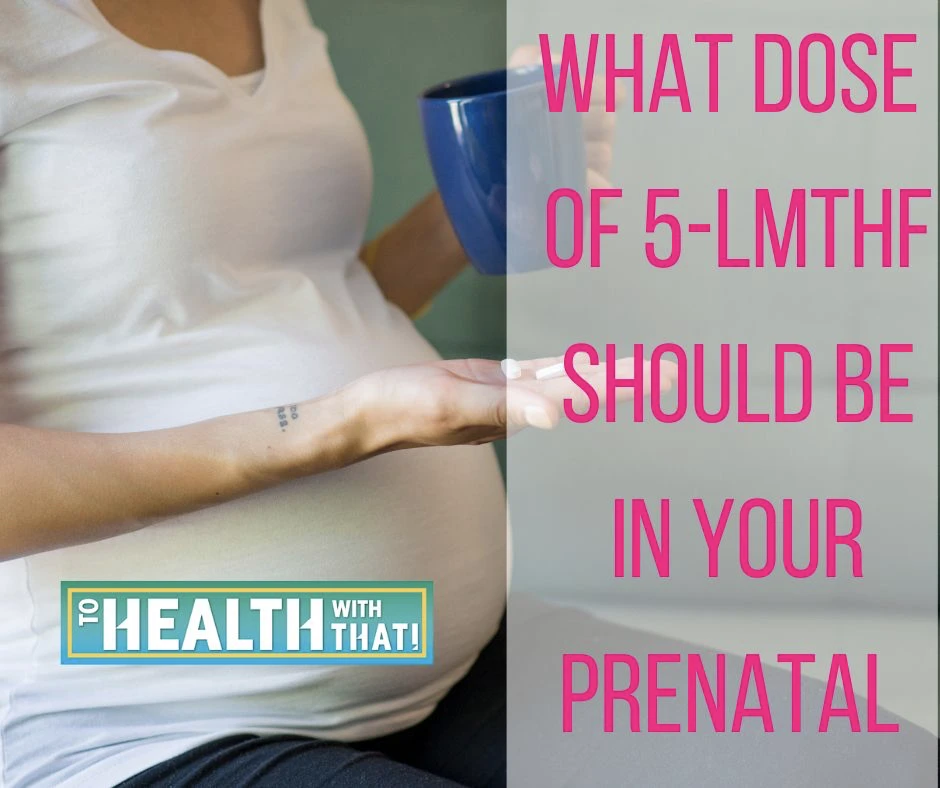This week, let’s talk about folic acid vs. 5-LMTHF in women and men with and without the MTHFR polymorphism, and in the show notes you can find research resources to share with your care team and OB/GYN or midwife.
This is an area with very little research and at the start I would like to say that 5,000 mcg of folic acid as an intervention for repeat pregnancy loss is very successful and has helped thousands of couples get to baby-in-arms. That is an amazing thing and so as a first step, especially for people without a known MTHFR polymorphism, this can be a really great intervention. Where I want to talk about doing something different, is when couples are still having fertility issues after trying with 5,000 mcg folic acid and failing or when one or both parties have two or more copies of an MTHFR mutation.
Also, possibly in couples where one or both parties are dealing with 2 bad copies of an MTHFR gene. This was the case for my husband and myself and 5,000 mcg folic acid never felt right for us.
The most important piece of research to take to your midwife or fertility practitioner is a study published in the Journal of Assisted Reproduction and Genetics in 2018.
This study followed 33 couples in which one or both of the partners had an MTHR polymorphism who had fertility problems lasting at least 4 years. You’ll notice that these folks are really well established in their fertility journey and have been trying for a very long time. This could include recurrent fetal loss, premature ovarian failure, or abnormal sperm parameters – so bear in mind this could be the mother or the father who has MTHFR issues. Two-thirds of these couples had previously failed assisted reproductive technology attempts.
Most of the women in this study had been previously treated, unsuccessfully, with 5000 mcg (or 5 mg) folic acid. This is really important becuase we don’t necessarily want to skip over this step.
The couples in this study were given 600 mcg 5-LMTH, which is the active form of folate, for four months before attempting conception or starting another round of assisted fertility treatment. This four-month period was chosen to allow for a complete cycle of spermatogenesis, which is approximately 74 days.

What Happened When Couples Switched from Folic Acid to 5-LMTHF?
The results of this one simple intervention were, in my opinion, absolutely astounding. Of the 33 couples:
-
2 were still in treatment at the date of reporting.
-
13 couples conceived spontaneously (this is after four years of unsuccessful reproductive attempts)
-
14 achieved successful pregnancies using ART (assisted reproductive technology). ART typically refers to IVF or in-vitro fertilization.
-
3 couples did not achieve successful pregnancies.
-
1 couple failed to report back.
This means that 27/33 couples got pregnant after four years of infertility struggles by changing this one simple thing. The only thing they did differently was switch from folic acid to 5-LMTHF.
I am going to read the conclusion of this research article verbatim because I can’t say it any better.
“The conventional use of large doses of folic acid (5 mg/day) has become obsolete. Regular doses of folic acid (100–200 μg) can be tolerated in the general population but should be abandoned in the presence of MTHFR mutations, as the biochemical/genetic background of the patient precludes a correct supply of 5-MTHF, the active compound. A physiological dose of 5-MTHF (800 μg) bypasses the MTHFR block and is suggested to be an effective treatment for these couples. Moreover, it avoids potential adverse effects of the UMFA syndrome, which is suspected of causing immune dysfunction and other adverse pathological effects such as cancer (especially colorectal and prostate).”
– Servy EJ, Jacquesson-Fournols L, Cohen M, Menezo YJR. MTHFR isoform carriers. 5-MTHF (5-methyl tetrahydrofolate) vs folic acid: a key to pregnancy outcome: a case series. J Assist Reprod Genet. 2018;35(8):1431-1435. doi:10.1007/s10815-018-1225-2
What is the Optimal Dosage of 5-LMTHF in a Prenatal?

The most startling result of this research, I feel, is the tremendous number of couples who conceived spontaneously after a simple few-month low-dose intervention with 5-LMTHF.
In terms of amounts – it is hard to say if this low 800 mcg dose is really the optimal dose during pregnancy for 5-LMTHF because that research hasn’t been done yet. Most prentals on the market that contain 5-LMTHF have a 1000 mcg dose, which is a good compromise between the 600 mcg folate recommended daily in pregnancy, and the whopping 5000 mcg dose often given in situations of repeat pregnancy loss of difficulty conceiving.
Some OB-GYN and midwifery teams are still unfamiliar with the use of 5-LMTHF in pregnancy, and talking seriously with them and presenting them with this research as a basis for your conversation will help them to see your point of view and encourage them to walk down this path with you as an alternative – especially if you have already tried 5,000 mcg folic acid.
What About UMFA?
UMFA stands for unmetabolized folic acid, and it’s a risk when using a high-dose folic acid intervention, but not with methylfolate. Some research has linked high levels of UMFA in pregnant mothers to increased risk of autism in their unborn children. UMFA has been detected in all age groups in the US, in part due to food fortification programs and so it is important to understand your risks and be aware of how much fortified food you take in. If you have an MTHFR mutation, it is best to avoid foods fortified with folic acid and all other sources of folic acid completely.

This podcast breaks up BIG health topics, like MTHFR, into small, easy bites. All in ten minutes or less.
We’ll talk about why folic acid can be toxic, how the MTHFR enzyme is in bed with estrogen, why you want to turn genes off, and how folate and depression are linked. Season 3 features Dr. Kate Naumes, women’s health expert, to deep dive into hormones and infertility.
Check the show notes at tohealthwiththat.com for more info and downloadable. Have MTHFR? Join genetic rockstars now at community.tohealthwiththat.com and for more info about Dr. Kate go to naumesnd.com
Doing a good detox protocol takes some preparation and some of the best preparation you can do is finding out if your genes are making detoxification harder for you somewhere. Some gene SNPs have the potential to make detox harder by interfering with phase two conjugation reactions. These include MTHFR, MTR, MTRR, GST, GPX, COMT, HNMT, UGT1A1, SULT genes, NAT1, and NAT2.
With each category of gene SNP, I will also give suggestions for improving that aspect of your phase two detoxification reactions.
00:00 – Intro
00:49 – Why SNPs matter and how to test
02:08 – Genes that affect methylation and how to help
02:46 – Genes that affect glutathione and how to help
03:38 – Genes that affect sulfation and how to help
04:20 – Genes that affect glucuronidation and how to help
05:52 – Genetic Rockstars walkthrough
07:42 – Genes that affect acetylation and how to help
08:11 – Amino acid conjugation
GENETIC ROCKSTARS (an MTHFR community): community.tohealthwiththat.com
FREE COURSE: MTHFR Basics: https://to-health-with-that.teachable.com/p/mthfr-basics
WORK WITH DR. AMY ONE-ON-ONE: Set up a free meet and greet appointment to see if we’re a good fit to work together, or if group coaching, community, or something else might be a better option: https://calendly.com/amy-tohealthwiththat/15min
GROUP COACHING: https://www.tohealthwiththat.com/group-coaching/
WEBSITE: https://tohealthwiththat.com/
AFFILIATE LINKS:
I appreciate you using these links to purchase products you would buy anyway, because they allow me to keep putting information out there. Thank you!
SEEKING HEALTH (methylation and histamine support supplements – these ship internationally): https://bit.ly/3afXYH4
STRATEGENE REPORT (detailed genetics using 23andme or ancestry raw data): https://bit.ly/3retbm5
FULLSCRIPT (professional grade supplements): https://us.fullscript.com/welcome/thwt
QUEEN OF THE THRONE (castor oil and castor oil packs): https://shop.queenofthethrones.com/amy-tohealthwiththat use code AMY_TOHEALTHWITHTHAT10 for 10% off of any order of $59 or more
—
Send in a voice message: https://podcasters.spotify.com/pod/show/tohealthwiththat/message

MTHFR is a common genetic mutation that can contribute to anxiety, depression, fatigue, chronic pain, infertility, and more serious conditions like breast implant illness, heart attack, stroke, chronic fatigue syndrome, and some types of cancer. If you know or suspect you have an MTHFR variant, schedule a free 15-minute meet-and-greet appointment with MTHFR expert Dr. Amy today.
Book Your Appointment
